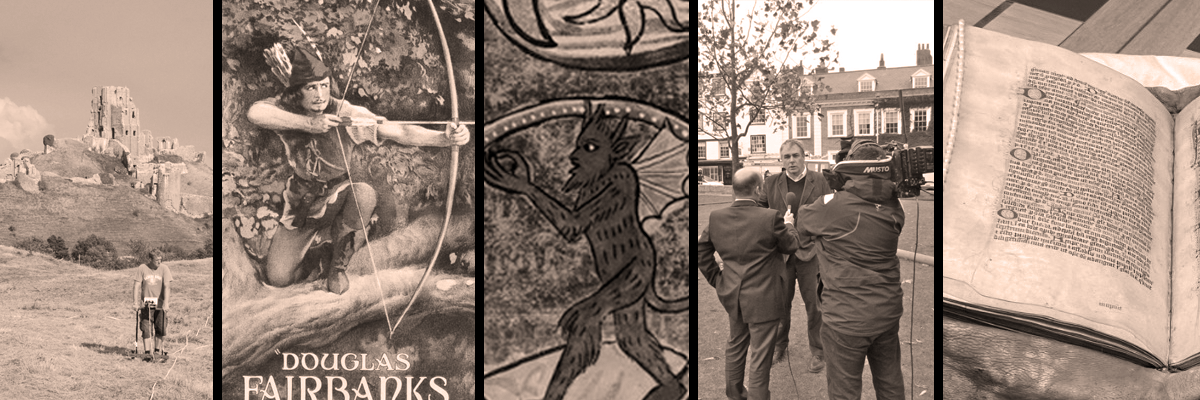
Posted by Edward Mills
30 September 2024Last week marked an impressive anniversary for the Exeter Medieval Studies blog: its tenth birthday! Our very first post — by James Clark, announcing a new research cluster — went live 23rd September 2014. Since then, we’ve published over 130 posts, on topics from across the range of medieval teaching and research that takes place here in Exeter.
With that in mind, and at the risk of seeming somewhat self-congratulatory, we thought we’d indulge in a little bit of web-based navel-gazing, and take a look back at the past decade of medievalist content available on this very site. Presenting … a top-ten of the most original, though-provoking and fun pieces published on the blog since its inception in 2014. For the sake of engagement, we’ve split the list into two, and this week, we’ll feature entries 10 to 6. (Note: this list is, of course, entirely subjective, and none of the authors featured in this two-part list know that they’re about to appear!)

Publication announcements are one of the staples of our blog, and Oliver Creighton’s contribution — one of our earliest in this vein — combined news on a co-edited volume with a broader conversation on what archaeology as a discipline (and ‘material evidence’ more broadly) brings to medievalists’ big conversations.

Another common topic on this blog is ‘medievalism’: ‘the modern reinventions and adaptations of the medieval past. One of the earliest interventions on this topic came from Helen Birkett, whose response to a new screening of the Douglas Fairbanks classic Robin Hood (1922) offered an fascinating insight into the film’s ‘liberal approach’ to historical accuracy (and why this might not necessarily be a bad thing). Bonus points for introducing us to a new phrase, in the form of ‘scop-knopping’, and for managing to mention Fairbanks’ ‘stunt chainmail’.

Over the years, a fair few posts on this blog have taken the form of interviews, and this entry — the first in a two-part series — was one of the first. Jennifer Farrell (whose work on medieval magic now forms part of our new Magic and Occult Science MA) gave the floor to three undergraduate students studying with her, Éléonore Raymakers, Emma Prevignano and Lauren Lloyd, as they interviewed Anne Lawrence-Mathers ahead of her seminar paper.

Anyone who was in Exeter on Friday 28th October 2016 will remember the palpable sense of shock as we saw the flames rising upwards from the Royal Clarence Hotel. The building had been a fixture of Exeter’s skyline for centuries, with a plausible claim to being Britain’s ‘first hotel’, and its sudden loss was a shock for anyone familiar with the city. In the midst of all of this, Todd Gray’s blog post — in which he told his story of working with media and the local council in the wake of events — gave us all a chance to reflect on what had happened, while also offering a powerful demonstration of how vital a historian’s work can be in the present.

The Education Incubator at Exeter recently made it possible for a team of undergraduates, supported by Centre members, to explore a number of the pre-modern manuscripts held at Exeter Cathedral Library and Archives. This post — one of two that resulted from the project — offers a close look at one such volume, the Pontifical of Edmund Lacy (MS 3513).
Join us again next week, where we’ll be counting down five more favourites from the past decade.
One response to “Ten Gems from the Past Decade: Part 1”
[…] Last week, we uncovered entries ten to six on our not-at-all-arbitrary ‘top ten’ list, celebrating ten years of posts on the Centre for Medieval Studies blog. This week’s post rounds out our selection, as we look at the top five most interesting, pertinent, or otherwise relevant posts that have stood the test of time. […]